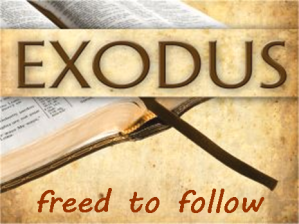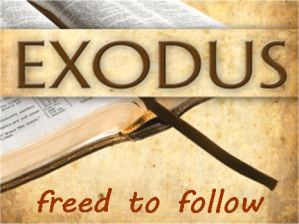Freed to Follow – an exodus Journey Week 3
- adrian kitson

- Sep 1, 2011
- 8 min read
BETWEEN THE TEXTS
Week 3
• We jump forward quite a lot this week moving from Exodus 3 to 12. A lot happens in between our selected reading!
• Remember, Exodus is all about two things – knowing God and vocation. Exodus is an account of knowing God through personal experience and how it is that God would call a nation to their vocation of being a blessing to the whole world.
• Chapter 5: Moses finally responds to God’s call (chapter 3), teams up with Aaron and gets to Egypt where he finally meets Pharaoh. It does not go well! It looks like this great mission has failed before getting off the ground as Pharaoh, with a very hard heart against Moses and Aaron’s God (Yahweh), hardens up the hard labour of the slave class masses. Moses’ people, as a direct result of his demand to Pharaoh to let the Hebrews go out into the desert to “serve” their God in a festival, demands that the slave labour force now are to make bricks without the usual supply of straw. They have to gather their own straw from wherever they can find it. • When the slave leaders protest, Pharaoh makes things even tougher. They have to make their same quota of bricks without any straw at all! You can see why the people are not exactly diving in to believe in Moses of follow him! • But, God has the plan. This is God the Commander-in Chief and mighty warrior getting ready to annihilate other gods in a show of complete dominance and power. Chapter 7:1-6 shows the plan in a nutshell. • Then we get to the “signs and wonders”, a few of which are in the form a “plagues” of various things. Here’s how it works…
• The gods of Egypt:
o Three levels of gods in a pantheon of 100’s of gods.
o Chief god, Amon Ra – Sun God.
o The sun makes light and its rising and setting brings order to creation
o The sun god takes an ordered journey everyday. The sun sinks into the underworld (night time) every day and there is a constant battle between Ra and Sem, the chief god of the underworld. Ra gains the vistory every day and rises again everyday.
o Pharaoh is Ra’s incarnate son on earth who has to perform various rituals daily to assist his “father” Ra in this ongoing battle to keep chaos and evil at bay, so that prosperity and life continue…
o Because Egypt lives on the waters of the Nile and did not know where this great water came from (No one did until the 19th century!), it was believed to come from the underworld. The Nile is a flooding river. Every year it floods and provided excellent flood plain conditions for crops. The underworld from where the water comes must be continually held back/defeated so that the floods come and life goes on.
o Animals are symbols of these deities at work
• The signs the God performs are set in this belief system. His defeat must be total and completely outside this system of belief, lest he just be seen as one of the many gods!
• Pharaoh is a god. He sees himself that way and his people see him this way. He must be destroyed for sake of God’s people and God’s plan to use this holy nation he has created to bring HIS blessing and life to all nations (including Egypt!)
• Chapter 5:1-12:36 is the contest between the Lord and Pharaoh
• SIGNS 1-3: Defeat of the powers of the underworld: Blood of the Nile, Frogs, Flies – all powers of the underworld in Egyptian thinking. The first two signs are copied by the sorcerers of Egypt but the third (the flies) acknowledged as being by the hand of Israel’s God. (8:16-19). Interesting that frogs were regarded in the pantheon of gods as being the gods of protecting women in childbirth – remember what Pharaoh did to Moses’ generation? Also interesting – this first defeat shows God’s power over magic, occult and dark spirits.
• SIGNS 4-6: Defeat of the powers of the earth: Mosquitoes/gnats, cattle plague and dust into boils for all living creatures (yuk!). Interesting that the plague of flies shows the first separation between what happens to Egyptians and Hebrews. (read 8:20-24)
• SIGNS 7-9: Defeat of the powers of the sky: Hail, Locusts Darkness across the land (no light – think about Amon Ra and Pharaoh and their place/roles….). In the plague of Hail, Pharaoh actually seeks forgiveness (9:27-25) and ask Moses to intercede for him to the Lord. Pharaoh does this again in the plague of locusts (the great threat of all ancient – and modern- food producers!). But he continues to “harden his heart”….
• THE KNOCKOUT BLOW: The death of all the firstborn of Egypt (11:1-12:36). Life in Egypt is cut off and disrupted. Amon Ra and his son have failed. They have been defeated by a greater God. Pharaoh fulfils God’s promise to let the Israelite go – with plenty of plunder (silver and gold and livestock etc….) and even ask Moses to bless him. Moses refuses to bless Pharaoh. The nation that is about to be freed and trained how to fulfil their vocation of being blessing carriers of blessing to all nations has no place for any other God and any other life than that lived in Yahweh’s blessing and life.
WEEK 3 Exodus 12:1-14 (TNIV)
The Passover and the Festival of Unleavened Bread ( numbers relate to THOUGHTS – the bullet points below)
1 The LORD said to Moses and Aaron in Egypt, 2 “This month is to be for you the first month, the first month of your year. 3 Tell the whole community of Israel that on the tenth day of this month each man is to take a lamb for his family, one for each household. 4 If any household is too small for a whole lamb, they must share one with their nearest neighbour, having taken into account the number of people there are. You are to determine the amount of lamb needed in accordance with what each person will eat. 5 The animals you choose must be year-old males without defect, and you may take them from the sheep or the goats. 6 Take care of them until the fourteenth day of the month, when all the members of the community of Israel must slaughter them at twilight. 7 Then they are to take some of the blood and put it on the sides and tops of the doorframes of the houses where they eat the lambs. 8 That same night they are to eat the meat roasted over the fire, along with bitter herbs, and bread made without yeast. 9 Do not eat the meat raw or boiled in water, but roast it over a fire—with the head, legs and internal organs. 10 Do not leave any of it till morning; if some is left till morning, you must burn it.
11 This is how you are to eat it: with your cloak tucked into your belt, your sandals on your feet and your staff in your hand. Eat it in haste; it is the LORD’s Passover.
12 “On that same night I will pass through Egypt and strike down every firstborn of both people and animals, and I will bring judgment on all the gods of Egypt. I am the LORD. 13 The blood will be a sign for you on the houses where you are, and when I see the blood, I will pass over you. No destructive plague will touch you when I strike Egypt.
14 “This is a day you are to commemorate; for the generations to come you shall celebrate it as a festival to the LORD—a lasting ordinance.
THOUGHTS
1. This is Israel’ great moment of salvation. It is THE event that shapes this new community of God and will do for all generations of faith.
2. You will notice our text is not the actual event. That is described after our text in 12:29-39. There is much to say about this event – before and after it! You can tell that it is a big deal by the amount of instruction, detail and time it takes to tell it how it is to be told – not just once, but in every generation of Hebrew people (up until now!).
3. The Month is the month of Nisan (no, not a car!) or “Abid”. It is in early spring time in the northern hemisphere – very fitting. It is around arch April – based on the lunar cycle (full moon).
4. It is our Easter time because the first Christian made the link between The resurrection of Jesus, God’s Son and his salvation and this event of Passover. Jesus established the Lord’s Supper on the night of the Passover. He was crucified during the festival of the Passover. He proclaimed himself to be “the true Passover lamb that was slaughtered for the life of the world…”
5. It is a holy meal in which nothing is to be wasted and nothing is to be done by one’s own authority. It is all God’s authority and power from beginning to end. It is about complete dependence on God and his saving love.
6. Only the best will do for this God of all power and love. He demands our best – our first fruits not our second best. He is holy and invites us to share in his holiness and love. Only our best offering will be what is required in our relationship with the Lord.
7. Blood is life in ancient thinking. No one has the authority to take another person’s blood/life – only the Lord and he does this for the freedom and love of his people as he defeats all evil. The links with Jesus and his teaching and life are endless. His blood is the once-for-all sacrifice for all sin of all time. He shed his blood on our behalf thereby freeing us from the wrath of God against all sin, chaos (disorder) and darkness. His blood protects as it did on the doorframes of their houses. His blood is that which we drink and it is healing, forgiveness and life for us from God. Jesus revolutionises this ancient meal that has held a nation together through thick and thin for thousands of years by making himself not only the priest of this meal but the actual meal – the Lamb of God who takes away the sin of the world!
REFLECTIONS
• The Lord’s Supper is our Passover – not once a year but all the time. Do you think you regard the Lord’s Supper in this way? • There is no room for gods when it comes to living in the Lord’s grace and power. A “idol” is anything we cling to for our well-being other than the Lord. Idols can be anything. See how receiving Jesus’ body and blood in simple repentance and faith in HIS blood and the life he gives, smashes our idols and cleanses our hearts and makes us holy before the Lord?
• Have you ever made these kinds of links with Easter? See how Easter is a deeply significant and timeless gift of the Lord for a world in need; so much more than a long weekend! So much worth entering into to receive the Lord’s blessing for our life and celebrating who we are as his saved and free people…..



Comments